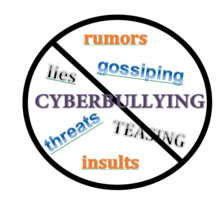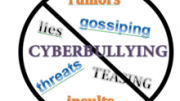Across Upstate NY, 26% of Teens Have Been Cyberbullied; In Capital Region, 22%
Majority of Both Teens and Parents have Witnessed Cyberbullying; Say it is Serious Problem
Parents Try to Supervise Active Online Teens but Most Teens say Parents Teeter between Not Strict & Clueless
ALBANY, NY – As middle and high school students spend more time online, a survey of Capital Region area teenagers and parents finds cyberbullying is a prevalent issue that touches a majority of area children. Twenty-six percent of teens surveyed across Upstate New York have been cyberbullied according to a study released today by Siena College Research Institute (SRI), AT&T and the Tyler Clementi Foundation. In the Capital Region, 22 percent of teens have been cyberbullied.
“In the Capital Region, one of every eight parents says that their child has been bullied online compared to one of every six parents across Upstate,” said Dr. Don Levy, SRI’s Director. “Virtually all parents and nearly 90 percent of teens both across Upstate and locally agree that cyberbullying is a serious problem that needs to be addressed before it gets worse.”
Fifty-four percent of teens and half of parents in the Capital Region have witnessed cyberbullying, including insulting or threatening comments posted online, pictures meant to embarrass, revealing videos shared online, and posted rumors or allegations about sexual activity. Nearly one-third of local teens say that their friends have been cyberbullied and 37 percent know other teens that have suffered online bullying. Over a quarter of Capital Region teens and 14 percent of local parents witness some form of cyberbullying at least a few times a month or more.
Online activities are a major part of Capital Region teens’ everyday lives. Eighty-five percent of teens spend an hour or more a day with online videos or games and 73 percent are online at least an hour a day socializing with their friends. Eighty-nine percent of area parents say that their child has their own smartphone. Nearly all parents say, and teens agree, that parents have talked with their child about ethical online behavior, including bullying, and 98 percent of parents say they have taught their children not to give out personal information online. But over a third of local teens have shared their name and gender with someone they met only online and 5 percent have agreed to meet up with someone that they met on the internet.
Forty-one percent of Capital Region parents have rules about technology that they monitor and enforce, while 44 percent have rules but admit they do not strictly enforce them. In fact, 14 percent of parents allow their children to make their own decisions. Only 14 percent of local teens say that their parents strictly monitor their online activities while 44 percent say that while they have rules, those rules aren’t strictly enforced. One third of teens say that their parents either aren’t very involved or simply have no idea what they are doing.
“Only, but perhaps only isn’t the right word, two percent of area teens say that they have been a cyberbully and two percent of parents acknowledge that their children have bullied others online,” Levy said. “But more, almost ten percent say that their friends have bullied others and over a third know other teens that have practiced cyberbullying.”
While over a quarter of the Capital Region teens say that they laugh it off when someone posts something negative about them, 15 percent of all area teens and almost a quarter of girls have cried because of something posted online about them or someone close to them. Of those that have been bullied, most — in fact, 55 percent — told their friends, 38 percent spoke to their parents, and a third confronted the bully, but only 21 percent told school officials.
Teens that have cyberbullied in the Capital Region say that they did so because they wanted to get back at someone, were angry at someone or about something or did so because they thought it was funny. In addition to those that admit to having cyberbullied, 16 percent of all teens say they posted something online that they regret, 8 percent have posted something that ended up hurting someone and 5 percent have posted something that they are not proud of that is still available online.
Asked why cyberbullies target others, large percentages of Capital Region teens cite many reasons: physical appearance (42 percent), social awkwardness (34 percent), being thought of as gay (36 percent), the clothes they wear (29 percent), being un-athletic (24 percent), having a disability (20 percent) or being sexually active (21 percent).
“Only twelve percent of those that witness cyberbullying say that they ignore it in part because they are afraid they will be the next victim,” Levy said. “Over a third reach out to the victim, 16 percent try to do something about it and a quarter report it. Addressing this serious problem will require the efforts of not only teens and their parents but also school officials and concerned citizens.”
“This first-hand account of what teens are experiencing online is a powerful wake up call to the pervasiveness of cyberbullying and its potential damaging effects,” said Marissa Shorenstein, New York State president of AT&T. “The results show that awareness of cyberbullying is high in the Capital Region, and more education is needed to help teens make better online choices. By better understanding the extent of the issue, AT&T and the Tyler Clementi Foundation hope to help teens and parents more safely navigate a connected world.”
To help that navigation, AT&T created Digital You last year, a comprehensive public education resource offering tools, tips, apps, guidance and community education events for people of all ages and levels of online experience. It provides education about digital dilemmas and using the Internet to a positive and safe outcome.
“These stats speak to the staggering problem of cyberbullying,” said Jane Clementi, founder and board member of the Tyler Clementi Foundation. “It’s outrageous and simply unacceptable to allow this to continue. Aggressive behaviors in the electronic world can cause great pain and destruction to one’s spirit. We must instill in our youth the knowledge that technology is only as good as the people who use it. It can be a wonderful and useful tool or a weapon of great harm and destruction, as in the case of many young people today, including my son Tyler.”
Working with the Tyler Clementi Foundation, AT&T has made addressing the rise of cyberbullying a priority and will be launching a national program in 2017 for high school students across the county featuring award-winning short films and documentaries produced by high school students from across the country for AT&T’s Cyberbullying Film Invitational. These films and documentaries are based on the students’ own unique and personal experiences. The program was previewed ahead of the national launch at an event in Albany at the Palace Theatre to mark National Anti-Bullying Week in collaboration with SRI and the Tyler Clementi Foundation. There will be additional previews of the program in high schools in Syracuse, Rochester and Buffalo later in the week.
# # #
The Siena College Research Institute (SRI) conducted 1,255 online interviews of students in grades 6-12 from across Upstate New York whose parents had provided explicit consent for their participation. SRI also conducted 1,048 online interviews with parents of students from the participating schools across Upstate New York. Interviews were conducted from September 26 – October 23, 2016.
The Siena College Research Institute, directed by Donald Levy, Ph.D., conducts political, economic, social and cultural research primarily in New York State. SRI, an independent, non-partisan research institute, subscribes to the American Association of Public Opinion Research Code of Professional Ethics and Practices.
ATT_Parent_Crosstabs_All_Statewide_Capital ATT_Student_Crosstabs_All_Statewide_Capital ATT_Poll_Press_Release_Final_Capital_Region



